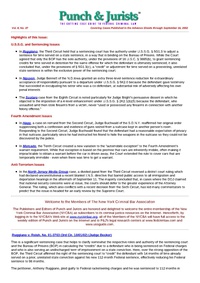In this case, the Sixth Circuit held that the Supreme Court's recent decision in Atkins v. Virginia, 122 S.Ct. 2242 (June 20, 2002) should be given retroactive effect. The petitioner, Danny Hill, was convicted of murder in Ohio and sentenced to death. After exhausting all of his state appeals, …
Here the Court held that a defendant who gave testimony which helped exculpate a co-defendant at substantial risk of adversely affecting his own penal interests was entitled to a special departure of 3 levels for extraordinary acceptance of responsibility.
In this case, over numerous objections from the Government, …
In Florida v. White, 526 U.S. 559 (1999), a bitterly divided Supreme Court established what has become known as the “automobile exception” to the Fourth Amendment’s warrant requirement. In that case, the majority held that "When federal officers have probable cause to believe that an automobile contains contraband, the …
Here, on remand, Judge Bushwald again granted a suppression motion, after responding to the 2nd Circuit's direction that it determine specifically whether the defendant had a pivacy interest in a suitcase in his house and not just in the house.
This is an interesting Fourth Amendment case, principally …
This case is noted particularly for Judge Bright's strong and persuasive dissent that the majority improperly affirmed an enhancement under USSG § 2K2.1(b)(5) despite the fact that the defendant had not used guns in connection with another felony offense.
While attending a party at the home of Erik …
Here the Court held that the district court had abused its discretion in prohibiting the defendant from engaging in commercial fishing as a special condition of supervised release because the condition was not reasonably related to the crime of conviction.
Defendant was convicted of possessing ammunition with a …
Here the Court held that a sentencing court had authority under U.S.S.G. § 5G1.3 to adjust a sentence for time served on a state sentence, in a way that is binding on the BOP and that does not conflict with the BOP's power under 18 U.S.C. § 3585(b).
…
Here the Court held that the district court committed reversible error by allowing the prosecutor to repeatedly ask witnesses to comment on the veracity of other witness testimony, where witness credibility was paramount to the case.
In this case the Court held that a Government motion, pursuant to U.S.S.G. § 5K1.1, for a downward departure to reflect a defendant's substantial assistance does not remove the constraint of a statutory minimum sentence and open the door for consideration of departure grounds unrelated to substantial assistance
The …
Shortly after the terrorist attacks on September 11, 2001, Attorney General Ashcroft ordered Chief Immigration Judge Michael Creppy to issue a directive to all U.S. Immigration judges requiring that they close deportation hearings of "special interest" cases. Special interest cases are those allegedly linked to terrorism investigations. The “Creppy …
Here the Court held that plain Apprendi error in not submitting drug quantity to jury would not be noticed due to “overwhelming evidence” of drug quantities supporting sentences in excess of statutory maximums.
Here the Court affirmed the denial of a downward departure due to extraordinary familiy circumstances under USSG § 5H1.6 based in the defendant's role model as a parent to a biracial child, whose father was Haitian and whose mother was Caucasian.
Defendant was convicted of 14 counts of …
